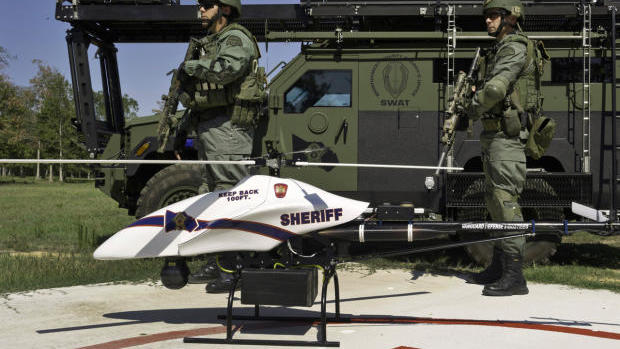Why Amazon's drone delivery service is a long way away
Amazon (AMZN) Chief Executive Jeff Bezos sent tongues wagging when he unveiled plans last year to deliver goods customers ordered over the Seattle-based company's website through a squadron of drones. Making Bezos' vision a reality is proving to be far more complicated than expected.
For one thing, the regulation of drones hasn't kept up with technology. Proponents of drones have criticized what they see as the FAA's one-size-fits-all approach to regulating drones, including mandating that operators be licensed pilots even though experts say the skills required to operate manned vehicles and unmanned aerial vehicles (UAVs) the technical name for drones, are vastly different. The e-commerce giant has dubbed the nascent service "Amazon Prime Air."
"One thing we know for sure (and via the FAA's own research) Predator pilots with conventional licenses make more mistakes than Army operators without a pilot's license in flying their UAVs," says Missy Cummins, who teaches courses about drones at the Massachusetts Institute of Technology and Duke University. "So making everyone get a license does nothing to improve safety."
Seattle-based Amazon is seeking a waiver from the FAA to conduct outdoor testing on its drones, which it hopes will be able to deliver light packages in 30 minutes. Amazon, which has come under fire on Wall Street for spending too much and earning too little, wants an exception to the agency's ban on drone commercial use, which is the subject of a legal challenge.
Paul Misener, Amazon.com's vice president of global public policy, noted in letter that the company has begun testing drones outside the U.S. because the regulatory environment is more friendly to the industry.
"These non-U.S. facilities enable us to quickly build and modify our Prime Air vehicles as we construct new designs and make improvements," he writes in a letter. "It is our continued desire to also pursue fast-paced innovation in the United States, which would include the creation of high-quality jobs and significant investment in the local community."
Amazon declined to comment beyond the letter. Officials from the FAA didn't respond to a request for comment for this story. But even if the FAA was in complete agreement with Amazon, the company wouldn't be able to flood the nation's skies with package-delivering robots.
For one thing, for drones to be able to be effective package deliverers, they will need to be able to route themselves to their destination with very little involvement from pilots, according to Phil Finnegan, an analyst with the aviation consultancy Teal Group. He noted that drone technology isn't advanced to that point yet, which is one of the reasons why Amazon is conducting tests.
"The Amazon.com service is not going to happen in six months, a year, or several years," he said in an interview. "It's going to take a long time."
Meanwhile, there are many tricky regulatory issues to work out.
Brendan Schulman, an attorney with Kramer, Levin, Naftalis & Frankel, who specializes in drone law, told CBS MoneyWatch in an interview that the FAA has been trying to craft drone regulations for nearly a decade. A 2012 law passed by Congress required the agency to have the laws written by September 2015, a deadline that many expect the agency to miss.
In Schulman's view, the FAA's approach to regulating drones is "overkill" and claims that drones pose no threats to commercial aircraft, despite the opinions of some that say they pose a safety risk.
"Operators like Amazon are not going to be the ones that fly near airports," Schulman said, adding that drones and aircraft rarely operate near one another. "It's relatively easy to keep the two separated."
